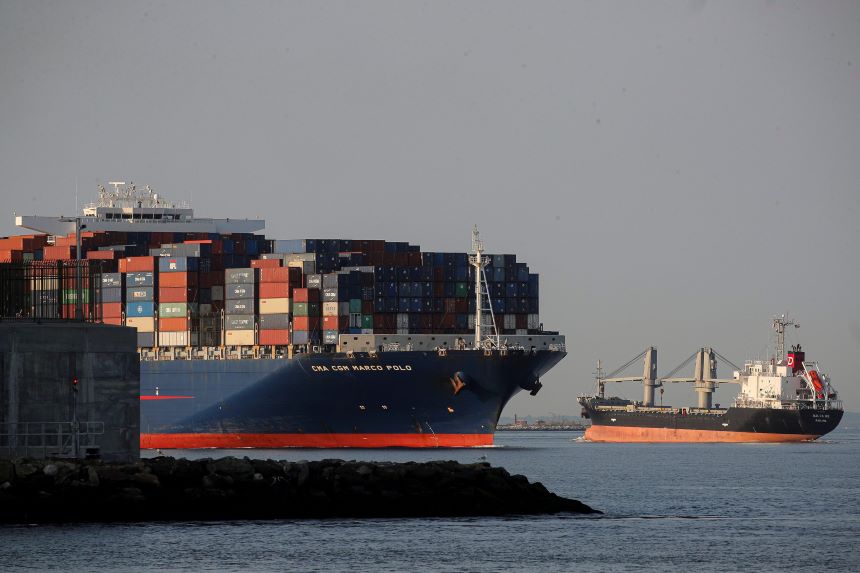Rohit Baniwal, writer
Brief news
- A strike by port workers on the East and Gulf Coasts is set to begin at midnight on Monday, potentially disrupting container traffic and costing the economy up to $5 billion daily due to stalled negotiations over wages.
- The International Longshoremen’s Association (ILA) represents 45,000 workers and claims the employer group, USMX, has not addressed long-standing wage issues, leading to the first coast-wide strike since 1977.
- The Biden administration is monitoring the situation, with retailers implementing contingency plans to mitigate impacts on holiday shipping, while concerns grow over economic repercussions if the strike extends.
Detailed news
On Monday at midnight, port workers in the United States’ East and Gulf Coast regions are scheduled to go on strike. There are currently no scheduled negotiations to prevent a cessation that could potentially disrupt container traffic from Maine to Texas and cost the economy up to $5 billion per day.
Negotiations regarding compensation have reached an impasse, precipitating the expiration of the labor contract between the United States Maritime Alliance (USMX) employer group and the International Longshoremen’s Association (ILA) union, which represents 45,000 port workers.
The ILA announced on Sunday that a port strike will commence at 12:01 a.m. ET on Tuesday. In a statement issued on Sunday, the union stated that the USMX “refuses to address a half-century of wage subjugation.”
The first coast-wide ILA strike since 1977 would occur if union members do walk off the job. This strike would impact terminals that manage approximately half of the nation’s ocean shipping.
A person with knowledge of the situation stated on the condition of anonymity that no negotiations are currently underway or are scheduled before the Monday deadline, as the subject matter is sensitive.
The union has previously stated that the strike will not affect military cargo transportation or cruise ship traffic.
However, a strike could halt the movement of a wide range of goods, including automobiles and food, at major ports, which could potentially result in the loss of employment and the acceleration of inflation in the weeks leading up to the U.S. presidential election.
The prospective strike at the East Coast and Gulf Coast ports is a matter of “deep concern” for the Business Roundtable, which represents key U.S. business leaders.
The organization forewarned that a labor strike could result in a daily economic loss of billions of dollars, which would harm businesses, workers, and consumers throughout the nation. “We strongly encourage both parties to reach a resolution prior to the deadline of Monday evening.”
Many companies have imported additional products in anticipation of a potential work suspension or have redirected more shipments to West Coast ports, which could result in a limited economic impact from a brief strike. However, an extended strike that persists for several weeks could have severe economic consequences.
Harold Daggett, the impassioned leader of the ILA, stated in a recent video post that “these individuals today are unaware of the concept of a strike.” “I will render you incapacitated.” I will render you incapacitated.
Daggett has been threatening to close down the 36 ports covered by his union for months if employers such as container ship operator Maersk and its subsidiary APM Terminals North America fail to provide substantial wage increases and cease terminal automation projects.
Businesses that depend on ocean shipping to export their products or secure essential imports are concerned about the dispute.
Steve Hughes, CEO of HCS International, a company that specializes in automotive procurement and transportation, accused the ILA of “holding the entire country over a barrel.”
Significant risks
An ILA strike could place President Joe Biden, who is pro-labor, in a no-win situation as Vice President Kamala Harris competes in a razor-thin election against former President Donald Trump.
Biden stated on Sunday that he did not intend to intervene to prevent a walkout if port workers were unable to secure a new contract.
Under the federal Taft-Hartley Act, U.S. presidents have the authority to intervene in labor disputes that pose a threat to national security or safety by imposing an 80-day cooling-off period. This period requires workers to return to work while negotiations are ongoing.
The Biden administration officials met with the USMX employer group on Friday to explicitly communicate the message that they must be present at the table and negotiate in good faith, fairly, and promptly. This message had been previously communicated to the ILA.
The ILA has been accused by the USMX of refusing to negotiate.
Retailers that are approaching the critical winter holiday sales season and account for approximately half of all container transportation volume have been diligently implementing contingency plans.
“If the East Coast Longshoremen strike, as is the consensus belief, there is the potential for another violent move across consumer stocks next week,” stated Jefferies analysts in a client note.
In order to prevent any strike-related disruptions, numerous major retail players expedited the delivery of Halloween and Christmas merchandise, resulting in increased shipping and storage expenses.
Mega-retailer Walmart, the largest container shipper in the United States, and Costco, a membership warehouse club operator, have stated that they are making every effort to reduce the potential impact.
However, a significant number of transporters are unable to take advantage of this flexibility due to their small size, reliance on the East and Gulf Coasts, or insufficient financial resources to accumulate safety stock.
Onx residences’ CEO, Ash Bhardwaj, operates facilities in Florida and imports the materials necessary for the construction of residences in the company’s planned communities through the Port of Miami.
He was resigned to his fate, as were other shippers in his position. Bhardwaj stated, “The issue will be universal.”
Source : CNBC News



